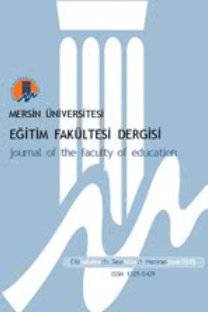Mahmut Polat1 Mehmet Fatih Taşar2
Mahmut Polat1 Mehmet Fatih Taşar2
___
- Abd-El-Khalick, F. & Lederman, N. G. (2000). Improving science teachers conceptions of nature of science a critical review of the literature. Journal of Science Education, 22(7), 665-701.
- Abd-El-Khalick, F. (2001). Embedding nature of science instruction in preservice elementary science courses: Abandoning scientism, but...Journal of Science Teacher Education, 12(3), 215-233.
- Abd-El-Khalick, F., Waters, M., Le, A. P. (2008). Representations of Nature of Science in High School Chemistry Textbooks over the Past Four Decades. Journal of Research In Science Teaching. 45(7), 835855.
- Aikenhead, G. S. (1988). An Analysis of Four Ways of a Assessing Student Beliefs About STS Topics. Journal of Research in Science Teaching. 25(8). 607- 629.
- Aikenhead, G. S., and Ryan, A. G. (1992). The development of a new instrument: "Views on science - technology - society"(VOSTS). Science Education, 76(5), 477- 491. American Association for the Advancement Of Science (AAAS). (1993). Benchmarks for science literacy: A Project 2061 report. New York: Oxford University Press.
- Bell, R. L. (2008). Teaching the Nature of Science through Process Skills. Boston: Allyn and Bacon.
- Bodur, Y. (2003). Preservice teachers leariıng of multiculturalism in a teacher education program. Unpublished doctoral dissertation, The Florida State University, Tallahassee, FL.
- Büyüköztürk, Ş., Bökeoğlu, Ö. Ç., ve Köklü, N. (2009). Sosyal bilimler için istatistik. Ankara: Pegema Akademi Yayınları.
- Case, S.L. (1997). Implementation of cooperative learning: Teacher beliefs and attitudes. Unpublished doctoral dissertation, University of California - Santa Barbara, Santa Barbara, CA.
- Chan, K.S. (2000). The impacts of infusing the interactive historical vignettes into 10th grade high school science instruction in Taiwan on Student understanding of the nature of science and science achievement. Unpublished doctoral dissertation, The University of Texas at Austin, Austin, TX.
- Haidar, A. H. (1999). Emirates pre-service and in-science teachers views about the nature of science. International Journal of Science Education, 21(8), 807-822.
- Harlan, S.L. (1996). Exploring early childhood education students' beliefs about art education. Unpublished doctoral dissertation, Rutgers, The State University of New Jersey, New Brunswick, NJ.
- Jeffries, C. & Maeder, D. W. (2005). Using Vignettes To Build and Assess Teacher Understanding of Instructional Strategies. The Professional Educator, 27(1- 2), 17- 28.
- Lederman, N. G., and O'Malley, M. (1990). Students' perceptions of tentativeness in science: Development, use, and sources of change. Science Education, 74(2), 225-239.
- Lederman, N. G. (1992). Students' and teachers' conceptions of the nature of science: A review of the research. Journal of Research in Science Teaching, 29(4), 331-359.
- Lederman, N. G., Wade, P., and Bell, R. L. (2000). Assessing Understanding of the Nature of Science: A Historical Perspective. In W. F. McComas (Ed.), The Nature of Science in Science Education (pp 331- 350). Dordrecht, Boston, London: Kluwer Academic Publishers.
- Lederman, N. G., Abd-El-Khalick, F., Bell, R. L., and Schwartz, R. S. (2002). Views of nature of science questionnaire: Toward a valid and meaningful assessments of learners conceptions of nature of science. Journal of Research in Science Teaching, 39(6), 497- 521. Milli Eğitim Bakanlığı. (2005). İlkögretim 6. ve 7. ve 8. Sınıf Fen ve Teknoloji Dersi Ögretim Programları. Ankara: Milli Eğitim Bakanlığı Talim ve Terbiye Kurulu Başkanlığı.
- McComas, W. F., Clough, M. P. ve Almazroa, H. (2000). The role and the character of the nature of science. Bulunduğu eser: W. F. McComas (ed), The Nature of Science in Science Education: Rationales and Strategies (331-350). Dordrecht, Kluwer Academic Publishers. National Research Council. (1996). National Science Education Standards. Washington, D.C: National Academy Press. National Science Teachers Association. (1982). Science- Technology- Society: Science education for the 1980s. Washington, DC: Author.
- Özçelik, D. A. (1997). Test Hazırlama Kılavuzu. Genişletilmiş Üçüncü Baskı, ÖSYM Eğitim Yayınları, Ankara.
- Özgelen, S. (2010). Exploring The Development Of Pre-Service Science Teachers Views On Nature Of Science In Inquiry-Based Laboratory Instruction. Unpublished doctoral dissertation, Middle East Technical University, Ankara.
- Roach, L.E. (1993). Use of the history of science in a nonscience majors course: Does it affect students understanding of the nature of science? Unpublished doctoral dissertation, Louisiana State University, Baton Rouge.
- Rubba, P. A., Andersen, H. O. (1978). Development of an instrument to assess secondary school students` understanding of the nature of scientific knowledge. Science Education, 62(4), 449- 458.
- Taşar, M. F. (2006). Probing preservice teachers understandings of scientific konowledge by using a vignette in conjuction with a paper and pencil test. Eurasia Journal of Mathematics, Science and Technology Education, 2(1), 53- 70.
- Yayın Aralığı: 3
- Başlangıç: 2005
- Yayıncı: Mersin Üniversitesi Eğitim Fakültesi
Okul Yöneticisi ve Öğretmen Görüşlerine Göre Okul Yöneticiliğinin Meslekleşmesinin Değerlendirilmesi
Sait AKBAŞLI, Abdullah BALIKÇI
M. Semih SUMMAK, Çiğdem ŞAHİN ÇELİK
Üç Boyutlu Sanal Dünyalarda Öğretim Materyalleri Geliştiren Tasarımcıların Karşılaştıkları Sorunlar
Romantik İnançlar Ölçeği’nin Uyarlanması: Geçerlik ve Güvenirlik Çalışmaları
Müzeyyen KÜÇÜKARSLAN, Cem GİZİR
Açık Sınıflar Eski Moda Bir Yenilik Olabilir mi?: ABD’den Bir Uygulama Örneği
İlke Evin Gencel, Arzu Güngör Leushuis
Sanat Eserlerini İncelemede Yaratıcı Drama Yönteminin Etkisine İlişkin Katılımcı Görüşleri
Türkçe Öğretmeni Adaylarının Dinleme Becerisi ve Dinleme Eğitimi Özyeterlik Algıları
Mehmet KURUDAYIOĞLU, Fatih KANA
Sınıf dışı eğitimin dünyadaki ve türkiye'deki gelişiminin incelenmesi
